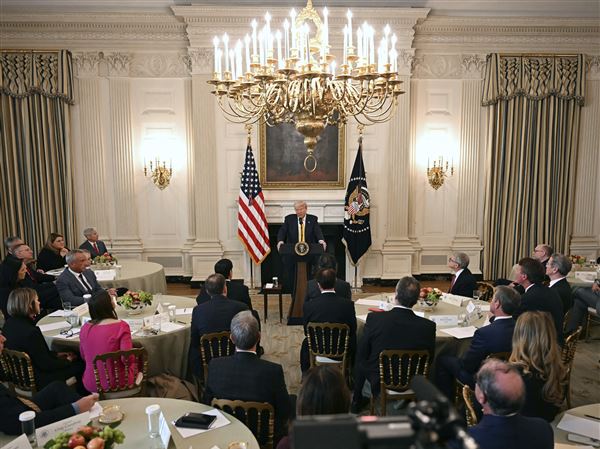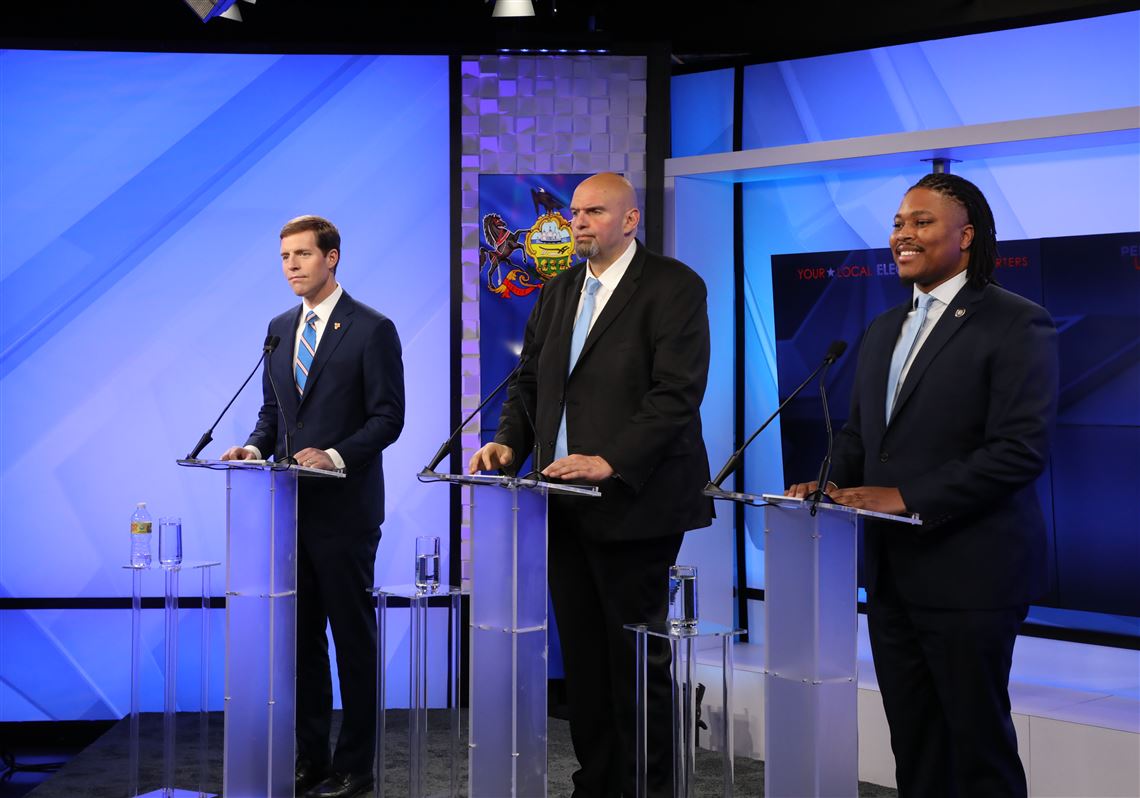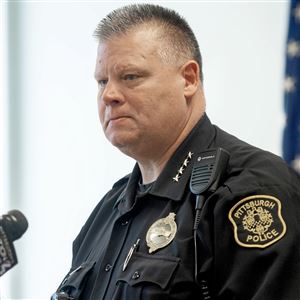A cross-governmental, all-hands-on-deck approach to gun violence — something that Pittsburgh Mayor Ed Gainey preached long before last weekend’s mass shooting in East Allegheny — has been championed by leading Democrats running for federal office in Pennsylvania.
The rhetoric has seeped into the primary race for one of the country’s most important seats at a time when gun violence is escalating in the state’s two biggest cities.
The top Democratic contenders for U.S. Senate, told by activists recently that gun safety could be a winning issue in November, got to put their ideas before voters this past week in the first televised, multi-market debate of the primary.
Given 60 seconds each to share their remedies, U.S. Rep. Conor Lamb, Pennsylvania Lt. Gov. John Fetterman and state Rep. Malcolm Kenyatta agreed that the federal government needs to take more action to get guns out of the hands of the nation’s youth.
Their words, at many points, echoed Mr. Gainey’s in the wake of last weekend’s house party shooting, which killed two teenagers and wounded 9 other people.
Leading the charge to call for a government crackdown on gun trafficking and the illegal flow of firearms into Pennsylvania communities has been Mr. Lamb, the 17th District Congressman and former federal prosecutor. Mr. Lamb said because of misguided budgeting, federal law enforcement isn’t able to prioritize firearms trafficking to the same extent it does non-violent drug crimes.
“I guarantee you that those children were not possessing an AR15 in Pittsburgh legally, but it got to them because we are too weak on the trafficking of these firearms,” said Mr. Lamb, who’s noted that the Drug Enforcement Administration gets about $4 in funding for every dollar the Bureau of Alcohol, Tobacco, Firearms and Explosives gets.
It’s a problem that the U.S. Department of Justice has grappled with more and more in recent years, pushing ATF to set up regional strike forces in coordination with U.S. attorneys. Attorney General Merrick Garland said last year that too often, guns found at crime scenes “come from hundreds or even thousands of miles away.”
In Pittsburgh, Police Chief Scott Schubert has said a priority has to be finding out how guns end up in the hands of the city's youth, and Mr. Gainey, in an interview with WESA this past week, said he’s been talking to law enforcement about how to crack down on gun traffickers.
“All these years that we’ve talked about gun violence in our neighborhoods, we’re still trying to figure out how they’re getting these guns in here,” Mr. Gainey said.
Mr. Fetterman, the former Braddock mayor who’s said the issue of gun safety singlehandedly drew him to public service, used his 60 seconds at the debate to remind voters that his campaign was the first to call for an elimination to the filibuster — a needed action if Democrats want to pass “commonsense” gun control legislation.
Gun control activists have said for years that the filibuster has blocked votes on gun violence prevention. The Brady Campaign to Prevent Gun Violence, a leading gun control nonprofit, has pointed to numerous occasions that the Senate’s rules have stifled legislation that would have otherwise passed, including the Manchin-Toomey bill to expand the background check system that was blocked in 2013.
This happens as a majority of Americans continue to support a number of gun control measures, Mr. Fetterman says.
“We are unable to [pass those measures] as a nation because that would require a threshold of 60 votes, which we will never get because we would need 10 to 12 Republicans to join our ranks and decide, ‘Yes, we want to join you in banning assault rifles. We want to join you in passing red flag laws,’“ Mr. Fetterman said.
Running on the idea that Democrats should lift up a candidate who’s experienced many of the problems people are facing, Mr. Kenyatta remarked that he could leave the debate, go home to North Philadelphia and find that another person was gunned down in his neighborhood. He said that just two days before, a 64-year-old man was shot in the head while sitting in his car.
Earlier this month, Philadelphia experienced a 24-hour-stretch in which at least 24 people were shot, five fatally, according to The Philadelphia Inquirer.
“For me, there are very few things that are more personal and emotional for me,” Mr. Kenyatta said.
Mr. Kenyatta said that safe communities are normally the ones that give families access to good jobs, good schools, quality healthcare and a dignified retirement.
It’s similar to the approach that Mr. Gainey has taken; he’s said that it’ll take addressing the underlying systemic issues — poverty, drug use and educational disparities, among others — to change the culture of violence.
Mr. Lamb, too, has said there’s an “entire world” of things the government should be investing in. He’s cited a program in the early 2000s in Philadelphia where community leaders, pastors and elected officials identified at-risk youth and intervened directly — not to funnel them into the criminal justice system, but to help them.
Specifically, Mr. Kenyatta also cited the need to get a handle on lost and stolen guns. He is a co-sponsor on a bill in Harrisburg that would require firearm owners to report their weapons lost or stolen to law enforcement within 72 hours of making the discovery.
Chief Schubert and federal authorities said this past week that — according to an investigation of 50 cases of juvenile gun violence in the Western District of Pennsylvania in recent years — nearly 49% of firearms recovered from juveniles, who cannot legally own handguns in Pennsylvania, were reported stolen.
“I think if we come together — everybody — and stop pointing fingers at everybody, at who’s responsible, and become a part of the action to fix it, I think we can,” Chief Schubert said.
The primary is May 17. The last day to register to vote is May 2.
Julian Routh: jrouth@post-gazette.com; Twitter @julianrouth
First Published: April 24, 2022, 10:00 a.m.

















